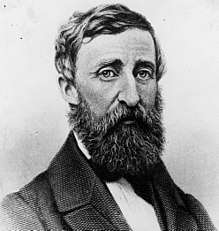Walking (Thoreau)
Walking, or sometimes referred to as "The Wild", is a lecture by Henry David Thoreau first delivered at the Concord Lyceum on April 23, 1851. It was written between 1851 and 1860, but parts were extracted from his earlier journals. Thoreau read the piece a total of ten times, more than any other of his lectures. "Walking" was first published as an essay in the Atlantic Monthly after his death in 1862.[1]

Transcendentalism in Walking/Form
"Walking" is a transcendental essay that analyzes the relationship between man and nature, trying to find a balance between society and our raw animal nature.
I would not have every man nor every part of a man cultivated, any more than I would have every acre of earth cultivated: part will be tillage, but the greater part will be meadow and forest.[2]
Part of Nature
I wish to speak a word for Nature, for absolute freedom and wildness, as contrasted with a freedom and culture merely civil, -to regard man as an inhabitant, or a part and parcel of Nature, rather than a member of society.[3]
Learn From Nature
I derive more of my subsistence from the swamps which surround my native town than from the cultivated gardens in the village.[4]
Nature is a spiritual Experience
According to Thoreau, and just as Emerson, being in nature is a spiritual experience, which shapes who we are,
For I believe that climate does thus react on man- as there is something in the mountain- air that feds the spirit and inspires. Will not man grow to greater perfection intellectually as well as physically under these influences?.[5]
Themes
Self-Reflection
Moreover, you must walk like a camel, which is said to be the only beast which ruminates when walking.[6]
In my afternoon walk I would fain forget all my morning occupations and my obligations to society. But it sometimes happens that I cannot easily shake off the village…What business have I in the woods, if I am thinking of something other than the woods?.[7]
The Wild and Society
Thoreau says,
all good things are wild and free.[8]
I rejoice that horses and steers have to be broken before they can be made the slaves of men, and that men themselves have some wild oat still left to sow before they become submissive members of society.[9]
here is this vast, savage, howling mother of ours, Nature, lying all around, with such beauty, and such affection for her children, as the leopard; and yet we are so early weaned from her breast to society, to that culture which is exclusively an interaction of man on man….[10]
Exploration
We go eastward to realize history and study the works of art and literature, retracing the steps of the race; we go westward as into the future, with a spirit of enterprise and adventure. The Atlantic is a Leathean stream, in our passage over which we have had an opportunity to forget the Old World and its institutions.[11]
See also
- Walden
- Old Marlboro Road, a poem within "Walking"
References
- "Walking". The Atlantic Monthly, A Magazine of Literature, Art, and Politics. Boston: Ticknor and Fields. IX (LVI): 657–674. June 1862. Retrieved February 1, 2018 – via Google Books.
- Thoreau (2000), p. 656.
- Thoreau (2000), p. 627.
- Thoreau (2000), p. 646.
- Thoreau (2000), p. 642.
- Thoreau (2000), p. 631.
- Thoreau (2000), p. 632.
- Thoreau (2000), p. 652.
- Thoreau (2000), p. 653.
- Thoreau (2000), p. 655.
- Thoreau (2000), p. 638.
- Thoreau, Henry (2000). Atkinson, Brooks (ed.). Walden and Other Writings. New York: Random House, Inc. ISBN 9780679783343.CS1 maint: ref=harv (link)
- Walking at Project Gutenberg
External links
| Wikisource has original text related to this article: |
- Walking. As published in Atlantic Monthly, 1862. https://www.walden.org/wp-content/uploads/2016/03/Walking-1.pdf
- Nationalism and the Nature of Thoreau's "Walking" Andrew Menard. http://www.mitpressjournals.org/doi/pdf/10.1162/TNEQ_a_00229